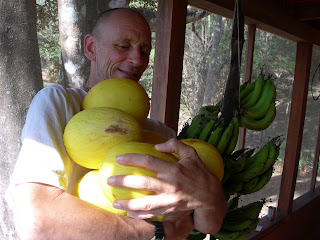“It’s just sugar water. They make it seem like something really good. Look at this one,'Don’t think of that cylindrical thing as a straw,Think of it as your pipeline to instant liquid refreshment !"
We
glimpse the outside world by the litter left on the roadside. I had an interest
in archeology and anthropology in my youth and read of scientists putting the puzzle together, trying
to learn something of a long lost society from bits of trash.
My son and I are on our daily 3 mile
walk, trying to absorb ourselves in our mantras.
“How could we change that to make it relate to what we do?”
I ask.
“Don’t think of that string of beads as a… string of beads,
but uh….”, Narayan begins.
“A pipeline….an instant connection to… hey look at this one. 'It's the tingle of the bubbles on my tongue and the cool blast of refreshment that makes this beverage....."

I find this
interesting. They create a thirst for something entirely useless, something that
gives no relief and no nourishment. Why put this advertising on the package?
The purchase has already been made. They want repeat customers, so they create
a mental situation to augment the experience of drinking flavored sugar
water. Why not use this technique to increase a thirst for something substantial?
“In moments Krishna will be dancing on your tongue. Can you
stand the wait?” A devotee sees the world in connection with Krishna
by utilizing everything in His service. Marketing and advertising techniques can
be used to draw the mind away from shallow attractions and focus on more substantial themes.
The Srimad Bhagavatam begins with a similar technique. Text
3 encourages us to drink (Pibata) the juice (rasam) from this tree ripened
fruit. The text claims that the book has grown on the tree of the Vedas, and
what you hold in your hands is the fruit, the essence of all the sweetness the
Vedas have to offer. Not only that, but the fruit has been made even more tasty
because of its being spoken by Suka.
We do most of our 'drinking' through our ears and
eyes. One must make healthy choices. When we hear of gossip, or
disappointment, we never 'Get Quenched', rather, we feel unhappy.
On Mother's day, we heard a Swami speak. We learned
that the love a mother has for her child is the purest form of love in this world. She gives
everything for the child's happiness, abandoning her own pleasure. In
return, the child gives dirty diapers, drool and vomit. To the mother,
these things appear as Sandalwood, Musk and Camphor. He spoke to a crowd
of 400 devotees, giving several examples of selfless motherly love.

He told of an 85 year old woman who came to the 'Eye Camp' in Varshana. If they could remove a cataract from only one eye, she would be happy, as she would again be able to cook for others. Just talking about it made her so happy, she began to sing and dance. Soon the entire clinic was dancing with her.

He told of an 85 year old woman who came to the 'Eye Camp' in Varshana. If they could remove a cataract from only one eye, she would be happy, as she would again be able to cook for others. Just talking about it made her so happy, she began to sing and dance. Soon the entire clinic was dancing with her.
Our thirst is to have such love as hers, to be happy to serve and care nothing for our own situation. That is how we will 'Get Quenched"
http://vedabase.net/sb/1/1/3/en
http://vedabase.net/sb/1/1/3/en























